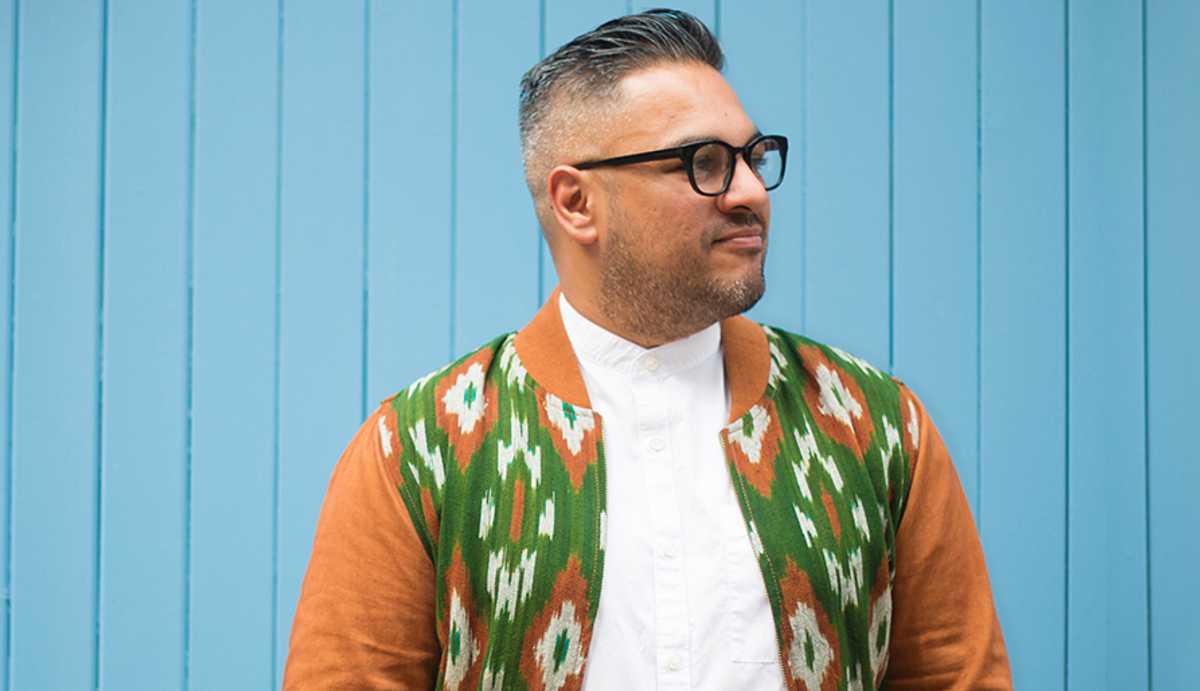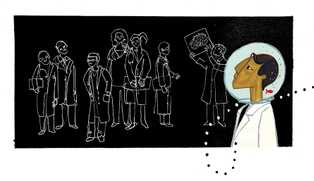We recently caught up with our friend Nikesh Shukla, who has been busy these past few months promoting his new book The Good Immigrant, speaking on panels across the country and using his various platforms to support writers and publications of colour. Luckily, we were able to steal some of his time to chat about his latest project The Good Immigrant (a collection of essays by 21 British writers, poets, journalists and artists of colour discussing race and immigration in the UK), working with writers of colour outside of the white publishing industry, why #wordsmatter, and how to remain optimistic and unified in post-Brexit Britain and Donald Trump’s America. If you haven’t already, add the book to your Christmas list. In fact, you should probably buy a few copies and hand them out whenever friends or family want to engage in conversations about Trump, Brexit or immigration. In Nikesh’s words, it’s “your perfect present idea for tense family situations.”
*
Skin Deep: What was the last really good meal you had? Nikesh Shukla: We made some keema this week that was so delicious two days later, because all the spices had been marinating, collaborating, gestating and creating the best damn spicy keema I’ve ever had. It’s Madhur Jaffrey’s recipe from her autobiography, so it’s apparently her family recipe. It’s so delicious and moreish. SD: How did you decide which authors you wanted to include in The Good Immigrant, and how did you collaboratively determine what particular themes you wanted to address? NS: Part of the reason I did the book was because I never wanted the lack of representation in books to be about a perceived ‘lack of talent’. I follow and read and know so many incredible writers of colour in the UK. I wanted to give them all a platform and make it obvious where to find them. And also make a statement: these people belong in a book, they need to have their names on a bookshelf. There wasn’t any real rhyme or reason to who I asked. I asked a bunch of people. Some said yes, some said no, some said: if I have time. And the book is pretty much that. In terms of what they wrote about, I realised, quickly, that my job as editor was to get out of everyone’s way as much as possible. The brief was for them to tell a story in their own voice, with race and immigration in the UK as a jumping off point, but not a necessity. And that way – if I put the choice on each writer – that way we would have a collection of essays from 21 different writers, rather than a political manifesto, a treatise on immigration. It was important that these voices have the space to disagree, to write their own experiences, have nuance, not be spokespeople for their race. SD: In many of the essays in The Good Immigrant the writers express a sense of feeling simultaneously ‘British’ and ‘Other.’ They explain, in different ways of course, that first, second and/or third generation immigrants feel part of a community that considers itself both ‘citizens of the world,’ and ‘citizens of nowhere’. What do you make of this space of being both and neither? NS: This inbetween world is the thing that concerns me the most. I think, maybe it’s more pronounced for the children of immigrants who came here. I don’t know. It’s hard to consider what it must be like for second or third generation kids. I think about the opening line of The Buddha Suburbia a lot, where Kureishi writes, “My name is Karim Amir and I am an Englishman, born and bred. Almost.” That “almost” is so loaded. In one word he sums up this idea of being inbetween. I think the rhetoric of being a ‘citizen of nowhere’ feels like such a parochial step backwards for the country. It’s as facile as Norman Tebbit’s cricket test. This idea of British values, ones that ask you to choose, ask you to not be both, to not be fluid, to force you to not code-switch, to give you a rooting to a past that is geographic rather than historic, to be nowhere in the world, to not understand where you come from, to only acknowledge where you’re at (a hip-hop adage that is as flawed as it is dope on the beat) – it makes me want to fight for my country. It’s weird. These comments make me want to fight for Britain, for Britishness, for a Britishness that acknowledges its colonial past, for multicultural Britain, for being a country innovating and leading the way in the world, for the country that birthed Jai Paul and Riz Ahmed and Zadie Smith and my cousin, Kapil. SD: In the 90s and early 2000s black and brown characters were few and far between in mainstream British television television and movies. Through American imports, we were introduced to characters like Apu in The Simpsons and Will Smith in The Fresh Prince. But recently there has been a sense that British media is finally beginning to pay attention to this narrative gap and the absence of meaningful portrayals of PoC. The recent commissioning of shows like Black & British and Ackee & Saltfish by the BBC gives one a reason to be hopeful. Are you optimistic about these developments and do you think that they’re emblematic of a larger institutional change that’s currently taking place in the British mediascape? NS: Yes. I have to be optimistic in the moment. Because it’s important that we see these movements as small steps forward, like we’re inching towards that perfect, almost unattainable goal of perfect equality and inclusion for all. Because I think optimism allows us to push forward when the momentum is there. From what I’ve seen, the entry levels of television, film and publishing are very diverse. It’s the senior management, the spaces that make decisions, that need to catch up. And if we can retain all the people in the entry level positions, and they can go on to succeed in their jobs and produce the amazing things they’re destined to, and they stick around long enough, they’ll get into those senior positions, and then things get very interesting. I think things are progressing, and the noise online calling for this progression is loud and proud and persistent, and I can only see that as a good thing. I’ve been cynical in the past, and I just don’t want to do that. I’m hoping the British Asian community gets a sitcom that can sit as an alternative to Citizen Khan soon. I know it’ll happen. And that’ll be amazing. SD: You’ve said in previous interviews that The Good Immigrant was inspired by texts such as Claudia Rankine’s Citizen and Ta-Nehisi Coates’ Between The World And Me. You couldn’t find a UK equivalent and so you decided to take on the task of creating one. There’s an amazing DIY culture emerging amongst PoC creatives who are tired of waiting for institutions to recognize the worth of what they’re trying to do. What has your experience been of working outside an institutional framework to produce a book like this? Would you do it again? And what do you wish mainstream publishers would understand about supporting the work of PoC writers? NS: What’s interesting about this question is I’ve seen some real change recently, specifically in the last year, with regards to supporting PoC writers. There’s been a recognition that the support from PoC writers will come from having a diverse team of publishing people commissioning and working on the books. And I think publishers are starting to work on projects, plans and opportunities that have some sort of long-term pay-off, which is the key. As it’s better than a knee-jerk opportunity of nothingness. So I think the will is there. For sure. People want to improve things but they don’t know how. I’m optimistic things are changing. And one of the reasons for this slow improvement, is the DIY stuff that people are doing, because they’re finding interesting writers, doing unbelievable things with them and finding readers, which is the key, because that’s ultimately what we’re all looking for. They take risks. And they nurture talent as well, because DIY cultures do this for the love, and if there’s one thing we love, it’s nurturing and fostering a sense of community. I remember once saying how much faith I placed in the idea of community in an interview and the journalist made fun of me for that. The success of The Good Immigrant is because of this idea of community. Knowing the community of readers exists. Knowing a community of writers. Treating that community of writers with trust, respect and honesty. And giving that community the platform to be themselves without pandering to any gaze. I don’t know if I work completely outside of the institutional framework of publishing, but I do think this book is successful because it put the business side to one side, and concentrated on the social impact side. Because words matter, books matter. Books can and do reflect society. Books can change the world. And in these dark times, the industry is doing lots of positive things, and while change is slow, I feel that we can publish some world-changing books. SD: You put this book together before Brexit and Trump’s election, but the political relevance of the project is undeniable in this moment. If you were compiling essays for The Good Immigrant now, and maybe you are currently in the midst of putting together a second book, what would be different? What and who would you want to include? NS: Yes, it’s funny that this book, a piece of representation for writers of colour specifically, suddenly gained another level of relevancy and urgency with the referendum results and with Trump. I think, post these two horrific events – with the increase in hate crimes and the rise of fascism – I think one of the things I’d do with a volume two would be to make it a political manifesto. I think the climate would automatically make it more political. I think I’d probably try and get more overt pieces on, say, class and also talk to writers from Eastern European communities. But I think it’s important that the first book not be a political manifesto. I think that’s where the furious optimism comes from, that it isn’t trying to be all-encompassing or representative. Instead it’s a showcase. I want people to judge the book on what’s in it, not what they want to be in it. SD: The other day you tweeted that your daughter said on her way to nursery: “That’s a purple car”. You used this anecdote as a way to think about the importance of children learning to call things as they are and the enduring importance of that lesson. Then, you used this story of your daughter to make a particularly striking point about a video that had been circulating on the internet about an ‘alt-right’ conference that had taken place in Washington, D.C, in which white nationalists had gathered to celebrate Donald Trump’s victory and some members had raised Nazi salutes as a terrifyingly racist and anti-semitic speech was being given. The video reminded many of the importance of understanding history and the importance of, as you said, calling things as they are – that if we start referring to these self-identified ethno-nationalists as white supremacists and neo-nazis we would be much in a much better position to understand who it is that we are dealing with. Then we might, as you said, “stand a chance as a viable opposition to the much more unified far right.” Given the complexity of this new linguistic landscape and what seems to be an increasing willingness to accommodate hate speech as part of free speech in post-Brexit Britain and in Donald Trump’s America, what do you think young people need to know to help them navigate and organise in an increasingly hostile political climate? NS: This is a difficult question to answer because I have no real answers. All I know is that I want to be optimistic and offer hope and resolve as much as I can. My friend Josie Long and I are working on a project called Agents Of Hope, which we hope to launch soon, where we get to get off the ground. I think I’m really sick of the left debating the importance of identity politics. Because the right has one unifying level of identity politics and it’s a scary place to be. You just have to look at the right and how quickly they mobilise, even after public spats and disagreements. And that’s scary, that their common purpose overrides any sense of identity. Meanwhile, the left is a mass of disparate marginalised groups who have come together but are slowing finding that we cannot unify. I blame a lack of understanding of intersectionality, to a degree. I worry that identity politics and whether the left should engage with it will be the death of us, which is pathetic, because identity politics gives us our strength. I am not ashamed of how I identify. It’s important to me. It gives me strength. We need to unify. We need to. SD: Finally, can you tell us more about your upcoming novel The One Who Wrote Destiny, and what else we have to look forward to from you? The new novel is very ambitious, for me. It’s not reliant on jokes. It’s set across four countries in four different time periods about four very different members of a dysfunctional family. There are elements of comedy, of magical realism, of place as a character. I’m in love with it. It’s the book I’ve been trying to write since before my first novel, since I first tried to write a novel at university. And I’m so proud to have finally finished it, and ended up on a ridiculously good publisher too. It’s a big novel, and it’s a weird one too, and it’s very inspired by Zadie Smith’s NW and Junot Diaz’s This Is How You Lose Her and Danzy Senna’s From Caucasia With Love and ZZ Packer’s Drinking Coffee Elsewhere and comedia dell’arte. I’ve said too much… Nikesh’s new book, The Good Immigrant, a collection of stories about race and immigration by 21 British writers of colour, is out now.



